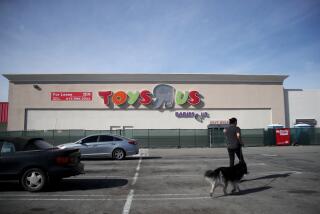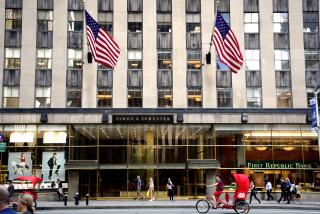Get Ready for a New Breed of Hostile Takeover
- Share via
With his surprise merger offer Monday for Southland-based Kasler Corp., Montana millionaire Dennis R. Washington has ripped a page right out of the 1980s Takeover Textbook.
Remember those days? First, you hire a savvy financial marksman to advise you (in this case, David Batchelder, the ex-T. Boone Pickens associate). Then you buy up a substantial number of the target’s shares on the open market (8.3% will do). Finally, you spring your offer, making sure to ask for rapid consummation so that the target doesn’t dally.
If this were the ‘80s, though, we’d be reporting today that Kasler’s stock price rocketed on news of the bid. Instead, the highway construction firm’s shares inched up all of 12.5 cents to $10.875 on the New York Stock Exchange on Tuesday.
The stock didn’t jump because Wall Street doesn’t quite know what to make of this deal. For one thing, Washington left out one crucial ingredient: hard cash. Rather than buy up Kasler’s 10 million shares at some premium, 1980s-style, he merely wants to merge his private construction and mining operations with Kasler and create a larger public company--keeping two-thirds ownership for himself.
What’s the deal worth to Kasler shareholders? Nobody knows, because all Washington offers is an exchange of paper and the promise of a bigger, better-run company. Well, maybe, maybe not.
*
It may also be that the lack of reaction to Washington’s offer reflects the virtual disappearance of uninvited takeover bids in recent years. Seeing one now is like seeing the San Bernardino Mountains from downtown L.A. in mid-September--your first reaction is disbelief.
Yet, in fact, there’s good reason to believe that unwanted takeovers will become far more prevalent in the ‘90s than the recent lull implies.
The reason is simple: Big investors such as pension funds and mutual funds know that stock market gains overall will be average, at best, in the ‘90s, meaning single-digit. The only way to beat the average will be to make every stock in a fund count. So laggards must go, one way or another.
“What you’re seeing is a groundswell on the part of investment managers for higher returns,” says Rodger F. Smith, a partner at pension-consulting firm Greenwich Associates.
That is why giant pension funds such as the California Public Employees Retirement System, or CalPERS, are taking increasingly aggressive stances against major companies whose financial results have been miserable.
To judge the effectiveness of these new campaigns, one need only be reminded that the chief executives of IBM Corp., Westinghouse Electric and American Express have all been deposed in recent weeks because of rising shareholder ire over the companies’ performances.
Of course, those companies weren’t targets of hostile takeovers, per se. Unwanted offers for big companies disappeared when financing for such deals evaporated in 1990, and bankers aren’t likely to jump back into this game anytime soon.
But for large firms, the old hostile takeover offer has been replaced by a new shareholder hostility equally as effective in forcing change.
Likewise, shareholders of smaller- and medium-size companies such as Kasler Corp. are no less likely to sit still when they can clearly identify the laggards in their portfolios.
And knowing that, the Dennis Washingtons of the world may see tremendous opportunity ahead to force takeover deals on smaller firms that stumble. The new raiders don’t necessarily need a lot of money, or even a cash bid. All they must do is persuade the institutional shareholders that the company would be better off with new management and new direction. Big investors’ willingness to listen has never been greater.
*
Why is Kasler a target? In the increasingly competitive market for highway construction, Kasler faces declining profit this year, and no assurance of a turnaround in 1994. Its stock, which peaked at $15.50 in 1991, has been stuck for months around $10. While requesting anonymity, major Kasler investors say they aren’t thrilled with management.
Joining Kasler with Washington Contractors Group would create a company that would have had $300 million in sales last year and $20 million in earnings. Based on Washington’s offer to give Kasler shareholders a one-third stake in the new firm, it would have about 30 million shares outstanding. So on a one-for-one share exchange by Kasler owners, their stock (at $10.875 now) sells for 16 times the earnings of “new Kasler.”
That isn’t cheap. But Washington hopes to persuade Kasler investors, if not management, that his road-building business and mishmash of other operations, including phosphate and gold mining, would complement Kasler’s highway construction business and result in a faster-growing firm overall--and thus a higher stock price.
Working against Washington is that Wall Street is suspicious of his claim that his private business was twice as profitable as Kasler last year. In a private firm, numbers can we worked like alchemy. Still, Kasler faces a cold reality here: The mere promise of change is worth more to many investors today than management’s excuses.
Rise, and Fall, of the Hostile Takeover
Almost nobody is doing hostile corporate takeovers these days. But some experts believe that the business is ripe for a renaissance, as more institutional investors put pressure on laggard companies to perform.
Value of announced hostile takeovers, in billions of dollars:
1985: 66.1
1986: 63.9
1987: 70.2
1988: 127.1
1989: 44.6
1990: 12.9
1991: 4.0
1992: 1.8
Source: Securities Data Co.
More to Read
Inside the business of entertainment
The Wide Shot brings you news, analysis and insights on everything from streaming wars to production — and what it all means for the future.
You may occasionally receive promotional content from the Los Angeles Times.










